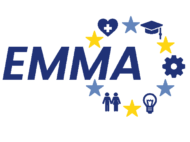As part of developing our online Masters in Active Ageing and Age Friendly societies, the EMMA consortium came together to learn more about online pedagogy in a three-day training event hosted by University College Cork (UCC) in late 2021. Fittingly, this event was itself online! The participants included three core groups: educators (i.e. lecturers/teaching faculty); pedagogical experts; and e-learning experts (i.e. “learning technologists”, “instructional design experts”).
This blog is my account of the event- I would highly recommend other universities consider such events, partnering up with other institutions to maximise peer-learning.
Goals of the training event:
The aim was that at the end of the training event, all partner universities would:
• Have a cohort of educators and e-learning experts with core competencies in online learning techniques
• Have a common understanding of the pedagogy of online learning
• Use a common language and terminology in relation to online learning
The thinking behind the event was also that institutions with less expertise in online learning would gain knowledge from institutions with more expertise, by sharing of “best practice” examples and via group discussions. And of course we expected to think more about the structure and content of the Masters, as it is difficult to consider pedagogy solely in abstract terms without naturally moving into discussion of practical examples and decisions that need to be made.
Content covered in the event
The event began with broad pedagogical approaches, with presentations on the Student Centred Approach and Constructive alignment by the team from Karelia University of Applied Sciences, Finland. Next, Sarah Thelen, lecturer in Teaching and Learning Enhancement (Digital Education), from UCC, led a session on synchronous versus asynchronous learning, and the pros and cons of both. Consistency was another key topic, including the use of a single learning platform, a common language, a consistent order to menu content online, an agreed visual identity etc. Sarah facilitated two sessions covered assessment in detail, including marking rubrics, using assessment to gate content, feedback versus feedforward assessment, and the value of student-directed feedback (where the student requests specific feedback on certain aspects of their course work). A further session considered assessment at the programme level.
On the final day, each university presented “best practice” in online pedagogy from their institution, showing how they use platforms Moodle and Canvas, and including helpful practical learnings from cases where the reality of delivery didn’t match aspirations! One particularly interesting presentation from the University of Lisbon was on the use of machine learning in Moodle to optimise student engagement, based on research performed by the speaker. This highlighted the possibilities of online learning to meet students’ needs and to allow personalised learning without taking up too much of the instructor’s time.
Some learning from the training event:
Both active and passive learning need to be considered within an overall student-centred learning approach. [Active learning requires the student to take an active part in the learning, such as taking part in a group discussion, practicing a skill, or even teaching their peers; this type of learning is known to increase knowledge retention]. Synchronous learning helps lecturers get to know students and improves student-student bonding and peer-learning. It has a particular role if the learning needs to be responsive to student input- whereas if it is a fixed piece of learning, or it is necessary to endure all students reach a certain level of understanding before a discussion, it can be asynchronous. Blended learning (i.e. a mix of synchronous/ asynchronous) can be incorporated in many ways, such as where students work individually as part of a small group, linking together asynchronously to progress the work, and then the groups are brought together for discussion and group learning or peer review. Another example discussed was using a pre-recorded lecture and then having a live group discussion on the lecture. Regardless of the mix of synchronous/ asynchronous learning, any programme needs to create space for discussion for peer learning, and also space for self-directed learning.
The value of using a common language to describe the breakdown of the master’s programme, aligning to EU convention was highlighted. We agreed that modules would describe the larger parts which make up the entire programme (5, 10, 15 ECTS), units would be parts which make up a single module, and lessons would be parts of a unit. Similarly, we agreed on the value of having a single module template (for structure, content, assessment, etc) and a responsible person to monitor adherence by module creators.
Within the discussion on assessment, the key link between learning outcomes and assessment came up again and again. Gating of content was an interesting sub-discussion, and whether this might be done by date or by test (self-assessment) result.
The optimal number of students per online module was felt to be 25-30 students, while the optimal number in a “small group” for shared learning was 5-8.
Issues and actions raised by the training event
It became clear early on that we needed to develop a Glossary of Terms for the programme, so that all module developers would have a common understanding of each term, so this became part of the actions for the programme development. A key issue to be considered was whether content was grouped by topic, or chronologically (i.e. Week 1, Week 2, etc).
We also needed to consider the use of ‘profiling’ or gatekeeping, and guidance, in choosing modules and module content to study. This support can be very time-consuming for programme and module-providers, but could be automated to a degree (eg self-survey) or could be done as small groups. Staying on the theme of student choice, it was discussed how even core modules could incorporate some options or allow some students to delve into deeper levels. We also discussed how some modules that we had initially considered as “core” modules might be better as optional, and how it was important to not make assumptions as to what students already know or want to learn.
The pros and cons of late submission penalties for postgraduate students who might be working full-time while studying was hotly debated, as was the number of repeat attempts allowed. In the end, this was left as an item to be discussed more at future project group meetings!
Take-home messages from the training event
Overall, I learned lots of new concepts and I found the training event really inspiring. I have tried to use the learning in some current online programmes – the end of year feedback from my students will tell me how I succeeded in this. I am finishing this blog with some key tips from the training event that you might find useful.
Key tips:
- Consider the culture of the students- are they tech-savvy, lone- or group-workers, etc., remembering that cohorts can differ each year
- Be very explicit in instructions to students – make no assumptions
- Develop an overall programme communication policy to share with students- e.g. expected lecturer response time; ways to make contact, consider a Frequently Asked Questions page
- Carefully consider the learning time for all content (especially for non-native speakers)
- Consider a glossary of terms for students
- Limit online tools to those absolutely needed – “simpler is better”
- Consider an ‘induction to online learning’ short module
- “Chunk” the learning: break up learning into small units and add reading etc. to this content
- Choice is key- students should not feel forced to learn things.
Author information:
Prof Suzanne Timmons, Centre for Gerontology and Rehabilitation, University College Cork


